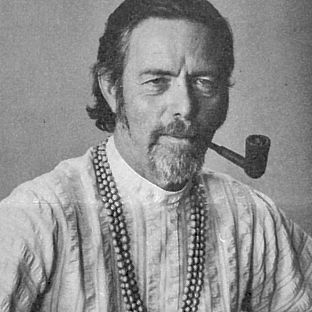# Alan Watts
#teachers

**Alan Wilson Watts** (6 January 1915 – 16 November 1973) was an English writer, speaker and self-styled "philosophical entertainer", known for interpreting and popularising Japanese, Chinese and Indian traditions of [Buddhist](https://en.wikipedia.org/wiki/Buddhist "Buddhist"), [Taoist](https://en.wikipedia.org/wiki/Taoist "Taoist"), and [Hindu](https://en.wikipedia.org/wiki/Hinduism "Hinduism") philosophy for a Western audience. Born in [Chislehurst](https://en.wikipedia.org/wiki/Chislehurst "Chislehurst"), England, he moved to the United States in 1938 and began [Zen](https://en.wikipedia.org/wiki/Zen "Zen") training in New York. He received a master's degree in theology from [Seabury-Western Theological Seminary](https://en.wikipedia.org/wiki/Seabury-Western_Theological_Seminary "Seabury-Western Theological Seminary") and became an [Episcopal](https://en.wikipedia.org/wiki/Episcopalianism "Episcopalianism") priest in 1945. He left the ministry in 1950 and moved to California, where he joined the faculty of the American Academy of Asian Studies.
Watts gained a following while working as a volunteer programmer at the [KPFA](https://en.wikipedia.org/wiki/KPFA "KPFA") radio station in [Berkeley](https://en.wikipedia.org/wiki/Berkeley,_California "Berkeley, California"). He wrote more than 25 books and articles on religion and philosophy, introducing the emerging [hippie counter culture](https://en.wikipedia.org/wiki/Counterculture_of_the_1960s "Counterculture of the 1960s") to _[The Way of Zen](https://en.wikipedia.org/wiki/The_Way_of_Zen "The Way of Zen")_ (1957), one of the first best selling books on Buddhism. In _Psychotherapy East and West_ (1961), he argued that Buddhism could be thought of as a form of [psychotherapy](https://en.wikipedia.org/wiki/Psychotherapy "Psychotherapy"). He considered _Nature, Man and Woman_ (1958) to be, "from a literary point of view—the best book I have ever written". He also explored human consciousness and [psychedelics](https://en.wikipedia.org/wiki/Psychedelic "Psychedelic") in works such as "The New Alchemy" (1958) and _The Joyous Cosmology_ (1962).
After Watts' death, his lectures found posthumous popularity through regular broadcasts on public radio, especially in California and New York, and more recently on the internet, on sites and apps such as YouTube and Spotify. The bulk of his recorded audio talks were recorded during the 1960s and early 1970s.